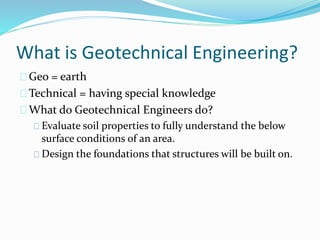The Basic Principles Of Geotheta
The Basic Principles Of Geotheta
Blog Article
Geotheta Things To Know Before You Get This
Table of ContentsAbout GeothetaNot known Facts About GeothetaAll About GeothetaSee This Report on GeothetaSome Known Details About Geotheta

They carry out website examinations, gather examples, perform laboratory examinations, and examine data to examine the suitability of the ground for building and construction projects - Geo Tech Engineer. Based upon their searchings for, geotechnical designers offer recommendations for foundation layout, incline security, preserving structures, and mitigation of geotechnical hazards. They work together with other professionals, such as designers, structural designers, and building teams, to make certain that geotechnical considerations are incorporated into the overall project design and implementation
By analyzing the behavior and properties of dirt and rock, they can determine prospective geotechnical hazards such as landslides, dirt negotiation, or incline instability. Their expertise assists prevent failures or crashes that might jeopardize lives and property. Below are some detailed tasks and duties of a geotechnical designer: Website Examination: Geotechnical engineers conduct site investigations to collect information on subsurface problems.
They translate the data to comprehend the residential properties and habits of the soil and rock, including their strength, permeability, compaction characteristics, and groundwater problems. Geotechnical Analysis and Style: Geotechnical engineers assess the information gathered during website examinations to examine the stability and suitability of the site for building and construction tasks. They execute geotechnical computations and modeling to assess factors such as birthing ability, negotiation, incline stability, side planet stress, and groundwater circulation.
Some Of Geotheta
Structure Layout: Geotechnical designers play an essential role in making structures that can safely sustain the desired framework. They evaluate the soil conditions and lots demands to determine the ideal foundation kind, such as superficial structures (e.g., footings), deep structures (e.g (https://www.avitop.com/cs/members/geotheta.aspx)., piles), or specialized methods like dirt enhancement. They think about factors such as settlement limitations, birthing capacity, and soil-structure interaction to establish optimum structure designs
They evaluate construction plans, display site activities, and carry out area evaluations to confirm that the design referrals are adhered to. If unexpected geotechnical issues develop, they examine the circumstance and offer recommendations for removal or adjustments to the layout. Threat Assessment and Reduction: Geotechnical designers evaluate geotechnical dangers and risks linked with the job site, such as landslides, liquefaction, or dirt erosion.

Partnership and Interaction: Geotechnical designers function carefully with various other professionals entailed in a project, such as designers, architectural designers, and building groups. Effective communication and collaboration are necessary to integrate geotechnical factors to consider right into the overall project layout and construction procedure. Geotechnical designers supply technical competence, answer inquiries, and ensure that geotechnical needs are met.
Geotheta Fundamentals Explained
Here are some kinds of geotechnical designers: Structure Engineer: Foundation designers specialize in designing and analyzing foundations for frameworks. They evaluate the soil conditions, tons needs, and site characteristics to figure out the most appropriate foundation type and design, such as superficial foundations, deep foundations, or redirected here specialized methods like heap structures.
They review the factors influencing slope stability, such as dirt residential properties, groundwater conditions, and incline geometry, and develop techniques to stop incline failures and mitigate risks. Quake Designer: Quake engineers focus on examining and designing structures to withstand seismic forces. They analyze the seismic hazard of a website, evaluate dirt liquefaction capacity, and establish seismic design criteria to ensure the safety and security and strength of frameworks throughout earthquakes.
They carry out area screening, gather samples, and evaluate the collected information to identify the dirt buildings, geologic formations, and groundwater problems at a site. Geotechnical Instrumentation Designer: Geotechnical instrumentation engineers concentrate on monitoring and gauging the behavior of soil, rock, and frameworks. They set up and preserve instrumentation systems that monitor aspects such as soil negotiation, groundwater degrees, slope movements, and architectural variations to examine performance and give very early warnings of possible issues.
The Geotheta PDFs
They perform tests such as triaxial examinations, debt consolidation tests, straight shear examinations, and permeability tests to collect data for geotechnical analysis and style. Geosynthetics Designer: Geosynthetics engineers focus on the layout and application of geosynthetic products, such as geotextiles, geogrids, and geomembranes. They make use of these materials to enhance dirt security, enhance slopes, offer water drainage services, and control disintegration.
They often tend to be investigatory individuals, which indicates they're intellectual, introspective, and investigative. They are curious, systematic, logical, analytical, and rational. A few of them are additionally social, meaning they're kind, generous, cooperative, individual, caring, handy, compassionate, skillful, and friendly. Does this audio like you? Take our cost-free profession examination to discover if geotechnical engineer is just one of your leading career matches.
In the workplace setting, geotechnical engineers make use of specialized software devices to execute computations, produce designs, and assess information. They prepare reports, testimonial task requirements, interact with clients and employee, and coordinate job activities. The workplace setting gives a favorable atmosphere for study, analysis, and cooperation with other professionals associated with the job.
Geotheta - Questions
They often see project sites to conduct website investigations, assess geotechnical problems, and gather data for analysis. These gos to involve taking a trip to different places, sometimes in remote or challenging surfaces. Geotechnical designers may perform soil tasting, conduct tests, and screen building and construction activities to make sure that the geotechnical facets of the task are being implemented correctly.
Geotechnical designers likewise operate in specialized geotechnical labs. In these facilities, they carry out experiments, carry out examinations on soil and rock examples, and analyze the design buildings of the materials. Geotechnical research laboratory engineers function thoroughly in these environments, handling testing tools, operating instruments, and recording information. They collaborate with various other lab personnel to make certain accurate and reliable testing outcomes.
Report this page